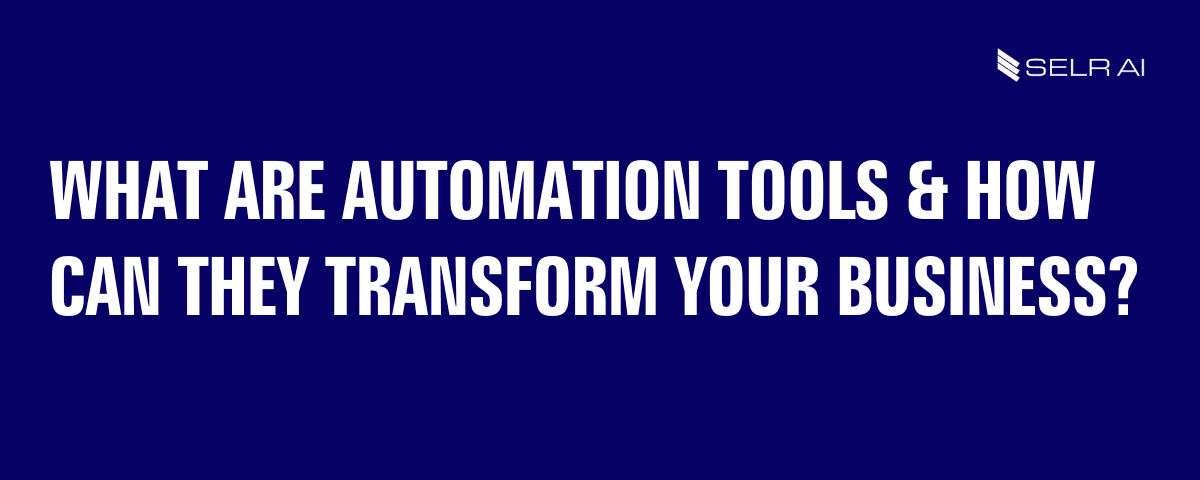Aug 30, 2024
What Are Automation Tools and How Can They Transform Your Business?
What Are Automation Tools and How Can They Transform Your Business?
What Are Automation Tools and How Can They Transform Your Business?
What Are Automation Tools and How Can They Transform Your Business?

Luke Heka
Luke Heka



Discover the world of automation tools that can revolutionise the way you do business. Dive into this guide to explore how these powerful tools can streamline processes, increase efficiency, and drive growth for your company.
Overview of Automation Tools
Automation tools are software applications designed to perform repetitive tasks automatically, reducing the need for manual intervention. These tools can range from basic email automation software to advanced robotic process automation (RPA) systems.
The primary goal of automation tools is to streamline workflows, increase accuracy, and save time and resources for businesses. By automating routine tasks, employees can focus on more strategic and creative aspects of their work, leading to higher productivity and job satisfaction.
Automation tools come in various forms, such as marketing automation platforms, customer relationship management (CRM) systems, and workflow automation software. Each type of tool serves a specific purpose in optimising different aspects of business operations.
Whether you're a small startup or a large enterprise, automation tools offer scalable solutions to enhance operational efficiency, reduce human error, and drive overall performance. Embracing automation is no longer a luxury but a necessity in today's fast-paced digital landscape.
In a nutshell, automation tools act as digital assistants, handling repetitive tasks with speed and precision, allowing businesses to operate more efficiently and competitively. From data entry to report generation, these tools can transform the way businesses function.
Benefits of Automation Tools
The benefits of automation tools are manifold, with one of the key advantages being increased productivity. By automating time-consuming tasks, businesses can boost their output without overburdening their workforce.
Automation tools also contribute to improved accuracy and consistency in operations. Human errors are minimised, leading to better quality control and customer satisfaction. Additionally, automation ensures that tasks are performed in a standardised manner every time.
Cost savings is another significant benefit of implementing automation tools in business processes. By reducing the need for manual labor and streamlining workflows, companies can cut down on operational costs and reallocate resources to more strategic initiatives.
Moreover, automation tools facilitate data-driven decision-making by providing real-time insights and analytics. Businesses can leverage this data to identify trends, optimise processes, and make informed strategic choices that drive growth and competitive advantage.
From accelerating time-to-market for products and services to enhancing customer experiences through personalised interactions, automation tools offer a wide array of benefits that empower businesses to thrive in a dynamic and ever-changing market landscape.
In essence, automation tools act as force multipliers, amplifying the impact of human efforts and enabling businesses to achieve more with less. By leveraging these tools effectively, organisations can unlock new opportunities for innovation and growth.
Implementing Automation in Your Business
The process of implementing automation in your business begins with identifying the areas that can benefit most from automation. Conducting a thorough assessment of your current workflows and pain points will help you pinpoint the tasks that can be automated for maximum impact.
Once you have identified the areas for automation, the next step is to select the right automation tools that align with your business requirements and objectives. Whether you need automation for marketing, sales, HR, or finance, there are a plethora of tools available to cater to diverse needs.
Collaboration between IT teams, business stakeholders, and end-users is essential for successful automation implementation. Clear communication, training, and ongoing support are crucial to ensure that the transition to automated processes is seamless and effective.
Testing and monitoring are integral parts of the automation implementation process. Regularly evaluating the performance of automated tasks, troubleshooting any issues, and optimising workflows based on feedback are essential steps to maximise the benefits of automation.
Continuous improvement is key to harnessing the full potential of automation tools. As your business evolves and grows, revisiting your automation strategy, exploring new tools, and fine-tuning existing processes will enable you to stay ahead of the curve and drive continuous innovation.
By embedding automation into the DNA of your business, you can foster a culture of efficiency, agility, and innovation that propels your company towards sustainable success in the digital era. Embrace automation as a strategic enabler for growth and transformation.
Choosing the Right Automation Tools
Choosing the right automation tools for your business requires a strategic approach and a deep understanding of your specific requirements. Consider factors such as the complexity of your workflows, the scalability of the tools, integration capabilities, and ease of use.
Evaluate different automation tools based on their features, compatibility with your existing systems, vendor reputation, and ongoing support. Opt for tools that offer comprehensive functionality, robust security measures, and reliable customer service to ensure a smooth implementation process.
It's essential to involve key stakeholders from different departments in the decision-making process to gather diverse perspectives and ensure alignment with business objectives. Collaborating with cross-functional teams can help identify gaps and opportunities for automation across the organisation.
Pilot testing the selected automation tools in a controlled environment can provide valuable insights into their performance, usability, and impact on operations. Gathering feedback from end-users and refining the automation strategy based on real-world scenarios will help fine-tune the tools for optimal results.
Ultimately, the goal of choosing the right automation tools is to enhance operational efficiency, drive innovation, and deliver tangible business outcomes. By investing in the right tools and technologies, you can future-proof your business and unlock its full potential in the digital age.
In conclusion, the journey of selecting and implementing automation tools is a strategic investment that can pave the way for sustainable growth, competitive advantage, and operational excellence. Choose wisely, implement thoughtfully, and reap the rewards of a transformed business landscape.
Unleashing Business Transformation
Embrace the future of business innovation with automation tools at your disposal. The possibilities are endless when you harness the power of automation to elevate your business operations to new heights. Start transforming your business today with SELR AI.
Discover the world of automation tools that can revolutionise the way you do business. Dive into this guide to explore how these powerful tools can streamline processes, increase efficiency, and drive growth for your company.
Overview of Automation Tools
Automation tools are software applications designed to perform repetitive tasks automatically, reducing the need for manual intervention. These tools can range from basic email automation software to advanced robotic process automation (RPA) systems.
The primary goal of automation tools is to streamline workflows, increase accuracy, and save time and resources for businesses. By automating routine tasks, employees can focus on more strategic and creative aspects of their work, leading to higher productivity and job satisfaction.
Automation tools come in various forms, such as marketing automation platforms, customer relationship management (CRM) systems, and workflow automation software. Each type of tool serves a specific purpose in optimising different aspects of business operations.
Whether you're a small startup or a large enterprise, automation tools offer scalable solutions to enhance operational efficiency, reduce human error, and drive overall performance. Embracing automation is no longer a luxury but a necessity in today's fast-paced digital landscape.
In a nutshell, automation tools act as digital assistants, handling repetitive tasks with speed and precision, allowing businesses to operate more efficiently and competitively. From data entry to report generation, these tools can transform the way businesses function.
Benefits of Automation Tools
The benefits of automation tools are manifold, with one of the key advantages being increased productivity. By automating time-consuming tasks, businesses can boost their output without overburdening their workforce.
Automation tools also contribute to improved accuracy and consistency in operations. Human errors are minimised, leading to better quality control and customer satisfaction. Additionally, automation ensures that tasks are performed in a standardised manner every time.
Cost savings is another significant benefit of implementing automation tools in business processes. By reducing the need for manual labor and streamlining workflows, companies can cut down on operational costs and reallocate resources to more strategic initiatives.
Moreover, automation tools facilitate data-driven decision-making by providing real-time insights and analytics. Businesses can leverage this data to identify trends, optimise processes, and make informed strategic choices that drive growth and competitive advantage.
From accelerating time-to-market for products and services to enhancing customer experiences through personalised interactions, automation tools offer a wide array of benefits that empower businesses to thrive in a dynamic and ever-changing market landscape.
In essence, automation tools act as force multipliers, amplifying the impact of human efforts and enabling businesses to achieve more with less. By leveraging these tools effectively, organisations can unlock new opportunities for innovation and growth.
Implementing Automation in Your Business
The process of implementing automation in your business begins with identifying the areas that can benefit most from automation. Conducting a thorough assessment of your current workflows and pain points will help you pinpoint the tasks that can be automated for maximum impact.
Once you have identified the areas for automation, the next step is to select the right automation tools that align with your business requirements and objectives. Whether you need automation for marketing, sales, HR, or finance, there are a plethora of tools available to cater to diverse needs.
Collaboration between IT teams, business stakeholders, and end-users is essential for successful automation implementation. Clear communication, training, and ongoing support are crucial to ensure that the transition to automated processes is seamless and effective.
Testing and monitoring are integral parts of the automation implementation process. Regularly evaluating the performance of automated tasks, troubleshooting any issues, and optimising workflows based on feedback are essential steps to maximise the benefits of automation.
Continuous improvement is key to harnessing the full potential of automation tools. As your business evolves and grows, revisiting your automation strategy, exploring new tools, and fine-tuning existing processes will enable you to stay ahead of the curve and drive continuous innovation.
By embedding automation into the DNA of your business, you can foster a culture of efficiency, agility, and innovation that propels your company towards sustainable success in the digital era. Embrace automation as a strategic enabler for growth and transformation.
Choosing the Right Automation Tools
Choosing the right automation tools for your business requires a strategic approach and a deep understanding of your specific requirements. Consider factors such as the complexity of your workflows, the scalability of the tools, integration capabilities, and ease of use.
Evaluate different automation tools based on their features, compatibility with your existing systems, vendor reputation, and ongoing support. Opt for tools that offer comprehensive functionality, robust security measures, and reliable customer service to ensure a smooth implementation process.
It's essential to involve key stakeholders from different departments in the decision-making process to gather diverse perspectives and ensure alignment with business objectives. Collaborating with cross-functional teams can help identify gaps and opportunities for automation across the organisation.
Pilot testing the selected automation tools in a controlled environment can provide valuable insights into their performance, usability, and impact on operations. Gathering feedback from end-users and refining the automation strategy based on real-world scenarios will help fine-tune the tools for optimal results.
Ultimately, the goal of choosing the right automation tools is to enhance operational efficiency, drive innovation, and deliver tangible business outcomes. By investing in the right tools and technologies, you can future-proof your business and unlock its full potential in the digital age.
In conclusion, the journey of selecting and implementing automation tools is a strategic investment that can pave the way for sustainable growth, competitive advantage, and operational excellence. Choose wisely, implement thoughtfully, and reap the rewards of a transformed business landscape.
Unleashing Business Transformation
Embrace the future of business innovation with automation tools at your disposal. The possibilities are endless when you harness the power of automation to elevate your business operations to new heights. Start transforming your business today with SELR AI.
Discover the world of automation tools that can revolutionise the way you do business. Dive into this guide to explore how these powerful tools can streamline processes, increase efficiency, and drive growth for your company.
Overview of Automation Tools
Automation tools are software applications designed to perform repetitive tasks automatically, reducing the need for manual intervention. These tools can range from basic email automation software to advanced robotic process automation (RPA) systems.
The primary goal of automation tools is to streamline workflows, increase accuracy, and save time and resources for businesses. By automating routine tasks, employees can focus on more strategic and creative aspects of their work, leading to higher productivity and job satisfaction.
Automation tools come in various forms, such as marketing automation platforms, customer relationship management (CRM) systems, and workflow automation software. Each type of tool serves a specific purpose in optimising different aspects of business operations.
Whether you're a small startup or a large enterprise, automation tools offer scalable solutions to enhance operational efficiency, reduce human error, and drive overall performance. Embracing automation is no longer a luxury but a necessity in today's fast-paced digital landscape.
In a nutshell, automation tools act as digital assistants, handling repetitive tasks with speed and precision, allowing businesses to operate more efficiently and competitively. From data entry to report generation, these tools can transform the way businesses function.
Benefits of Automation Tools
The benefits of automation tools are manifold, with one of the key advantages being increased productivity. By automating time-consuming tasks, businesses can boost their output without overburdening their workforce.
Automation tools also contribute to improved accuracy and consistency in operations. Human errors are minimised, leading to better quality control and customer satisfaction. Additionally, automation ensures that tasks are performed in a standardised manner every time.
Cost savings is another significant benefit of implementing automation tools in business processes. By reducing the need for manual labor and streamlining workflows, companies can cut down on operational costs and reallocate resources to more strategic initiatives.
Moreover, automation tools facilitate data-driven decision-making by providing real-time insights and analytics. Businesses can leverage this data to identify trends, optimise processes, and make informed strategic choices that drive growth and competitive advantage.
From accelerating time-to-market for products and services to enhancing customer experiences through personalised interactions, automation tools offer a wide array of benefits that empower businesses to thrive in a dynamic and ever-changing market landscape.
In essence, automation tools act as force multipliers, amplifying the impact of human efforts and enabling businesses to achieve more with less. By leveraging these tools effectively, organisations can unlock new opportunities for innovation and growth.
Implementing Automation in Your Business
The process of implementing automation in your business begins with identifying the areas that can benefit most from automation. Conducting a thorough assessment of your current workflows and pain points will help you pinpoint the tasks that can be automated for maximum impact.
Once you have identified the areas for automation, the next step is to select the right automation tools that align with your business requirements and objectives. Whether you need automation for marketing, sales, HR, or finance, there are a plethora of tools available to cater to diverse needs.
Collaboration between IT teams, business stakeholders, and end-users is essential for successful automation implementation. Clear communication, training, and ongoing support are crucial to ensure that the transition to automated processes is seamless and effective.
Testing and monitoring are integral parts of the automation implementation process. Regularly evaluating the performance of automated tasks, troubleshooting any issues, and optimising workflows based on feedback are essential steps to maximise the benefits of automation.
Continuous improvement is key to harnessing the full potential of automation tools. As your business evolves and grows, revisiting your automation strategy, exploring new tools, and fine-tuning existing processes will enable you to stay ahead of the curve and drive continuous innovation.
By embedding automation into the DNA of your business, you can foster a culture of efficiency, agility, and innovation that propels your company towards sustainable success in the digital era. Embrace automation as a strategic enabler for growth and transformation.
Choosing the Right Automation Tools
Choosing the right automation tools for your business requires a strategic approach and a deep understanding of your specific requirements. Consider factors such as the complexity of your workflows, the scalability of the tools, integration capabilities, and ease of use.
Evaluate different automation tools based on their features, compatibility with your existing systems, vendor reputation, and ongoing support. Opt for tools that offer comprehensive functionality, robust security measures, and reliable customer service to ensure a smooth implementation process.
It's essential to involve key stakeholders from different departments in the decision-making process to gather diverse perspectives and ensure alignment with business objectives. Collaborating with cross-functional teams can help identify gaps and opportunities for automation across the organisation.
Pilot testing the selected automation tools in a controlled environment can provide valuable insights into their performance, usability, and impact on operations. Gathering feedback from end-users and refining the automation strategy based on real-world scenarios will help fine-tune the tools for optimal results.
Ultimately, the goal of choosing the right automation tools is to enhance operational efficiency, drive innovation, and deliver tangible business outcomes. By investing in the right tools and technologies, you can future-proof your business and unlock its full potential in the digital age.
In conclusion, the journey of selecting and implementing automation tools is a strategic investment that can pave the way for sustainable growth, competitive advantage, and operational excellence. Choose wisely, implement thoughtfully, and reap the rewards of a transformed business landscape.
Unleashing Business Transformation
Embrace the future of business innovation with automation tools at your disposal. The possibilities are endless when you harness the power of automation to elevate your business operations to new heights. Start transforming your business today with SELR AI.
Discover the world of automation tools that can revolutionise the way you do business. Dive into this guide to explore how these powerful tools can streamline processes, increase efficiency, and drive growth for your company.
Overview of Automation Tools
Automation tools are software applications designed to perform repetitive tasks automatically, reducing the need for manual intervention. These tools can range from basic email automation software to advanced robotic process automation (RPA) systems.
The primary goal of automation tools is to streamline workflows, increase accuracy, and save time and resources for businesses. By automating routine tasks, employees can focus on more strategic and creative aspects of their work, leading to higher productivity and job satisfaction.
Automation tools come in various forms, such as marketing automation platforms, customer relationship management (CRM) systems, and workflow automation software. Each type of tool serves a specific purpose in optimising different aspects of business operations.
Whether you're a small startup or a large enterprise, automation tools offer scalable solutions to enhance operational efficiency, reduce human error, and drive overall performance. Embracing automation is no longer a luxury but a necessity in today's fast-paced digital landscape.
In a nutshell, automation tools act as digital assistants, handling repetitive tasks with speed and precision, allowing businesses to operate more efficiently and competitively. From data entry to report generation, these tools can transform the way businesses function.
Benefits of Automation Tools
The benefits of automation tools are manifold, with one of the key advantages being increased productivity. By automating time-consuming tasks, businesses can boost their output without overburdening their workforce.
Automation tools also contribute to improved accuracy and consistency in operations. Human errors are minimised, leading to better quality control and customer satisfaction. Additionally, automation ensures that tasks are performed in a standardised manner every time.
Cost savings is another significant benefit of implementing automation tools in business processes. By reducing the need for manual labor and streamlining workflows, companies can cut down on operational costs and reallocate resources to more strategic initiatives.
Moreover, automation tools facilitate data-driven decision-making by providing real-time insights and analytics. Businesses can leverage this data to identify trends, optimise processes, and make informed strategic choices that drive growth and competitive advantage.
From accelerating time-to-market for products and services to enhancing customer experiences through personalised interactions, automation tools offer a wide array of benefits that empower businesses to thrive in a dynamic and ever-changing market landscape.
In essence, automation tools act as force multipliers, amplifying the impact of human efforts and enabling businesses to achieve more with less. By leveraging these tools effectively, organisations can unlock new opportunities for innovation and growth.
Implementing Automation in Your Business
The process of implementing automation in your business begins with identifying the areas that can benefit most from automation. Conducting a thorough assessment of your current workflows and pain points will help you pinpoint the tasks that can be automated for maximum impact.
Once you have identified the areas for automation, the next step is to select the right automation tools that align with your business requirements and objectives. Whether you need automation for marketing, sales, HR, or finance, there are a plethora of tools available to cater to diverse needs.
Collaboration between IT teams, business stakeholders, and end-users is essential for successful automation implementation. Clear communication, training, and ongoing support are crucial to ensure that the transition to automated processes is seamless and effective.
Testing and monitoring are integral parts of the automation implementation process. Regularly evaluating the performance of automated tasks, troubleshooting any issues, and optimising workflows based on feedback are essential steps to maximise the benefits of automation.
Continuous improvement is key to harnessing the full potential of automation tools. As your business evolves and grows, revisiting your automation strategy, exploring new tools, and fine-tuning existing processes will enable you to stay ahead of the curve and drive continuous innovation.
By embedding automation into the DNA of your business, you can foster a culture of efficiency, agility, and innovation that propels your company towards sustainable success in the digital era. Embrace automation as a strategic enabler for growth and transformation.
Choosing the Right Automation Tools
Choosing the right automation tools for your business requires a strategic approach and a deep understanding of your specific requirements. Consider factors such as the complexity of your workflows, the scalability of the tools, integration capabilities, and ease of use.
Evaluate different automation tools based on their features, compatibility with your existing systems, vendor reputation, and ongoing support. Opt for tools that offer comprehensive functionality, robust security measures, and reliable customer service to ensure a smooth implementation process.
It's essential to involve key stakeholders from different departments in the decision-making process to gather diverse perspectives and ensure alignment with business objectives. Collaborating with cross-functional teams can help identify gaps and opportunities for automation across the organisation.
Pilot testing the selected automation tools in a controlled environment can provide valuable insights into their performance, usability, and impact on operations. Gathering feedback from end-users and refining the automation strategy based on real-world scenarios will help fine-tune the tools for optimal results.
Ultimately, the goal of choosing the right automation tools is to enhance operational efficiency, drive innovation, and deliver tangible business outcomes. By investing in the right tools and technologies, you can future-proof your business and unlock its full potential in the digital age.
In conclusion, the journey of selecting and implementing automation tools is a strategic investment that can pave the way for sustainable growth, competitive advantage, and operational excellence. Choose wisely, implement thoughtfully, and reap the rewards of a transformed business landscape.
Unleashing Business Transformation
Embrace the future of business innovation with automation tools at your disposal. The possibilities are endless when you harness the power of automation to elevate your business operations to new heights. Start transforming your business today with SELR AI.
Latest Blogs


